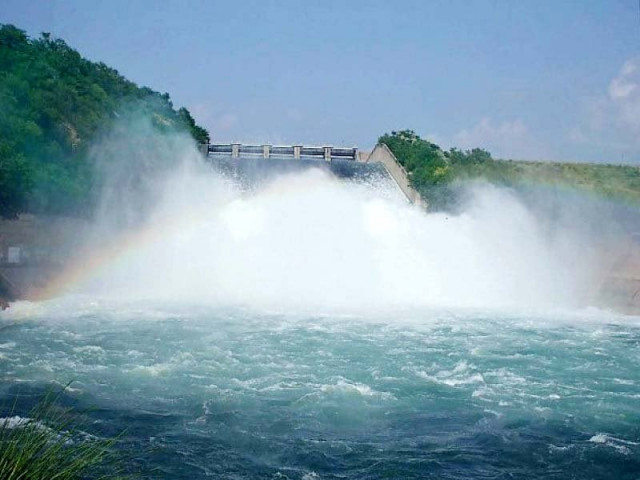Neelum Jhelum: CDWP clears power project at cost of Rs410 billion
Cost up due to price escalation, exchange rate losses; experts to assess estimate

India is building the Kishan Ganga project upstream and Pakistan has already lost its case in the international court and will not be in a position to produce 969MW due to a reduced flow of water. PHOTO: FILE
The government on Thursday cleared the 969-megawatt Neelum Jhelum hydroelectric power project at a revised cost of Rs410 billion with a pinch of salt as the scheme, despite being plagued with mismanagement and corruption, must be executed because of its strategic nature.
The project was approved during the first government of Benazir Bhutto in 1989 with the cost standing at Rs15.3 billion. The cost was first revised in 2002 during the General Pervez Musharraf government before Pakistan Peoples Party’s last government pushed the estimate to Rs274.9 billion in 2013.
Neelum Jhelum project: Deadline after deadline, PM wants to know final completion date
The current PML-N government has further revised the cost upwards, expecting a capital injection of Rs410 billion.
Sending the project for final approval of the highest decision-making body, the Central Development Working Party (CDWP) also ordered a third-party assessment of the higher cost.
Headed by Planning and Development Minister Ahsan Iqbal, the CDWP also conditionally cleared two projects valuing Rs49.2 billion for the installation of smart electricity meters and billing systems in the jurisdictions of Lahore and Islamabad power distribution companies.
Tarbela fifth extension project gets CDWP’s nod
Talking to The Express Tribune, Iqbal said he cleared the projects depending on four conditions.
One of these is that the Ministry of Water and Power will provide a certificate that its recommended technology is tested, suitable and reliable as per local requirements. Furthermore, local bidders will be allowed to participate in the tender and the project cost will not be more than the cost of similar projects in other parts of the world.
Talking about the Neelum Jhelum project, Iqbal said against the proposed cost, the CDWP cut the estimate by Rs4 billion by lowering the contingency component to the standard 3%.
He said the main increase in the cost was on account of price escalation and exchange rate losses, but independent experts would verify these claims.
Hydroelectric power plant: Financiers stop $433m loan for Neelum-Jhelum project
“The CDWP will prepare a summary for Ecnec (Executive Committee of National Economic Council) to highlight poor management of the project,” he said.
General (retired) Mohammad Zubair, who is the project CEO, has been accused of mismanagement.
India is building the Kishan Ganga project upstream and Pakistan has already lost its case in the International Court of Arbitration and will not be in a position to produce 969MW due to a reduced flow of water.
The Neelum Jhelum project will be completed at an exorbitant price of $4.23 million per megawatt - the highest ever for any hydroelectric power project, according to project documents. The cost of under-construction Dasu hydroelectric power project is estimated at $2.25 million per megawatt while the Bunji project will cost $1.87 million.
Neelum-Jhelum : Funding crunch slows down power project
At this price, the Neelum Jhelum project’s generation cost per unit will be Rs11.17, resulting in a loss of Rs0.93 per unit from the first day after its commissioning. At the price of Rs274.9 billion, the project was supposed to generate electricity at a profit of Rs1.71 per unit.
The National Accountability Bureau has launched an inquiry into the conduct of Wapda and project management officials after allegations of kickbacks in procurement of Rs19.5 billion worth of tunnel-boring machines.
The machines were brought with the argument that the project would be completed one and a half year ahead of the planned commissioning in November 2016. So far, only 70% civil work has been completed.
The exchange rate losses have been estimated at Rs72.4 billion, but the Planning Commission termed this figure inflated on the basis of actual loss of only Rs2.5 billion against the 70% work completed.
Wapda has claimed an increase of Rs63 billion in the price, which again is highly inflated given the fact that so far actual escalation was Rs29 billion against 61% completed work.
The project’s foreign loan requirement has also jumped from $328 million to roughly $1.9 billion.
Published in The Express Tribune, October 30th, 2015.
Like Business on Facebook, follow @TribuneBiz on Twitter to stay informed and join in the conversation.



















COMMENTS
Comments are moderated and generally will be posted if they are on-topic and not abusive.
For more information, please see our Comments FAQ